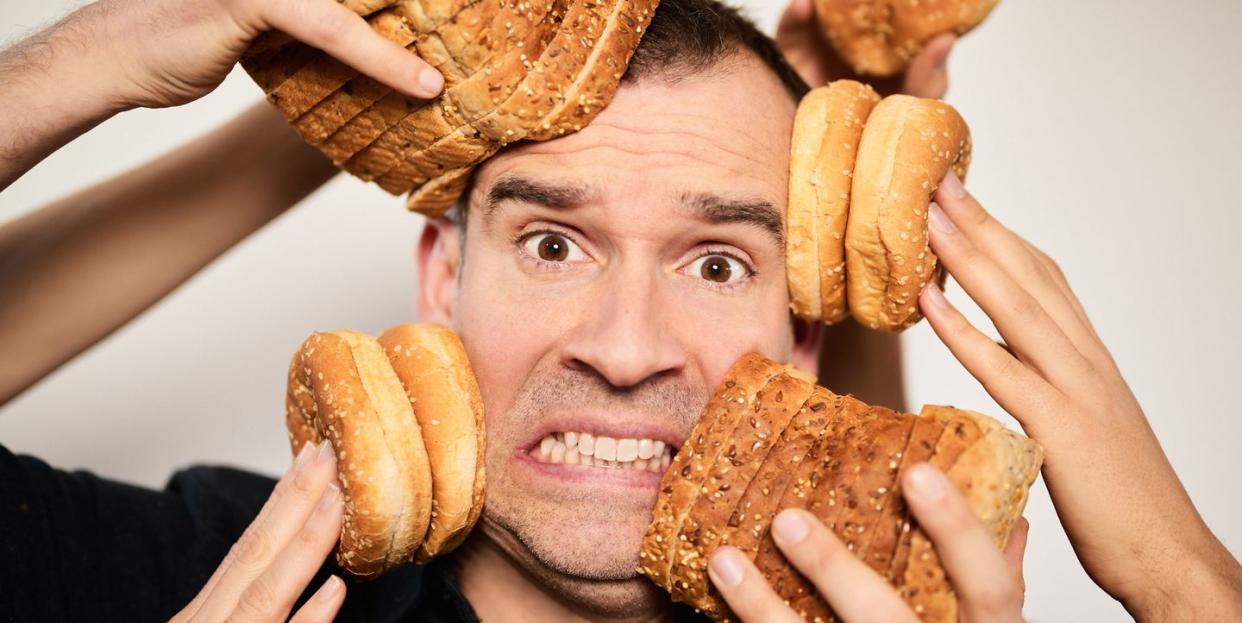Dr Chris Van Tulleken: ‘The Food Industry Isn’t Just like the Tobacco Industry. It Is the Tobacco Industry’

Dr Chris van Tulleken used to find it hard to control his eating. He never struggled with his weight, however, unlike his twin brother, Dr Xand van Tulleken, his co-presenter on a range of BBC science programmes including A Thorough Examination and the children’s show Operation Ouch!
But he did find himself compulsively drawn to ultra-processed foods (UPFs) – that is, novel industrial products designed to be convenient, cheap and moreish, often due to their additive content. ‘I really struggled,’ he says.
These days, however, he finds abstinence from UPFs pretty easy, having literally written the book on the subject: Ultra-Processed People: Why Do We All Eat Stuff That Isn’t Food... And Why Can’t We Stop? ‘I didn’t try particularly hard to give up UPFs,’ he says. ‘I just found that while writing the book, I became so disgusted, I couldn’t eat these foods any more.’
It’s a compelling and eye-opening read that exposes the harms of the modern food industry – food having recently overtaken tobacco as the leading cause of preventable death worldwide. It will leave you feeling angry, queasy and hopefully a little optimistic that a better way is possible.
Men's Health: A lot of people still find the whole business of ultra-processed foods a bit confusing. What’s your advice to them?
Dr Chris van Tulleken: We can argue endlessly about where to draw the line with ultra-processed foods – and that’s the argument that the food industry wants us to have, because it’s very distracting.
But as a general rule, all you need to do is look at the label and ask yourself how many of the ingredients you would find in a domestic kitchen. If it has things like xantham gum, modified corn starch, palm oil or emulsifiers in it, then it’s probably ultra-processed.
There’s lots and lots of evidence that a diet with a large amount of ultra-processed foods is associated with negative health outcomes. And what the UPF evidence highlights overall is that food has become the number-one leading cause of death worldwide, whether or not you gain weight. There’s more to food than its content of fat, sugar and salt.
Was there any particular food that surprised you while you were researching that book?
I don’t want to demonise any particular product. But the reason that there’s a loaf of bread on the cover of the book is because bread is kind of representative of the problem. Look at the ingredients: there are flavourings, there are preservatives, there are emulsifiers.
Now, one of the arguments put forwards by the British Nutrition Foundation – which is majority industry-funded by the way – is that people benefit from the whole grains in these ultra-processed products. It’s almost certain that wholegrain ultra-processed bread is better than white ultra-processed bread. But there’s also a lot of evidence that the emulsifiers, the fats, the flavourings, the extreme softness of that bread will drive inflammation, alterations in the microbiome and excess consumption.
My 10-year-old loves Nutella. It’s basically sugar and palm oil – but I feel mean depriving him of something that gives him pleasure. What’s your approach as a parent?
My kids eat a lot of Nutella and ultra-processed food in general because I think a really important part of childhood is to be normal. If you eat a diet that no one else eats, you become a bit excluded.
The book is unquestionably inducing a mild neurosis in my university-educated and middle-class friends. But the truth is, if you’re someone who reads Men’s Health and cooks at home and has the odd bit of Nutella, you’re probably going to be fine. I’m far more concerned about the teenagers for whom 85% of their diet consists of UPFs – or the people who can only afford UPFs.

Who do you think most needs to hear the message in your book?
There are two affected groups. One is people who live with food addiction. Food addiction is real. There’s good evidence for it. Likewise, binge-eating disorder. There is evidence that these people would benefit from abstinence from all ultra-processed foods.
Then there’s the group who are forced through disadvantage to eat a huge amount of UPFs, because they tend to be much cheaper than whole foods. If we did only one thing, it would be to combat poverty. Poverty is so expensive for our country. You could fix poverty for less than £80bn a year. And that would be so cheap to fix compared with dealing with its consequences.
There has been a huge explosion in high-protein foods and meal-replacement drinks in recent years. Do you find this concerning?
Some of these products have almost transcended the definition of ultra-processed and entered a hyper-processed realm. I’m not going to name names, but these meal replacement shakes often have no recognisable ingredients in them at all – they’re all amino acids, protein isolates, non-nutritive sweeteners, gums and gels. At least Tesco’s ice cream has sugar in it.
For all the harms of ultra-processed foods, you’re not in favour of banning them. How come?
What I want is for people to have true freedom and choice. I’m a food libertarian. If people want to eat bad food they should be able to. What I want is for people to have informed choices over what they eat. That means warning labels on [ultra-processed] food and making good food affordable. Disadvantaged people are effectively forced to buy shit food – and that just seems extremely unjust. So I’m not asking for bans.
Are warning labels really enough?
The reason I bang on about warning labels is the evidence from South and Central America, where they have started to put black hexagons on ultra-processed foods.
At the moment in the UK, a can of Coke has one red traffic light on it [for its sugar content] and three green traffic lights [fats, sat fats and salt]. That’s confusing because it suggests that Coca-Cola is mostly healthy.
Once you get warning labels, everything else becomes easier. That’s the food you can ban in schools, and the food you can change in prisons and in hospitals. That’s the food you can put some progressive taxes on. The discussion the industry wants us to have is a row about the definition of ultra-processed foods. The discussion we ought to have is, ‘How big should the warning label be?’
How big do you think they should be?
In Argentina, there are three warning labels on Coke – they sit above the logo and they are bigger than the logo. That’s how you do it.
The warning label comes first. Then come the marketing restrictions: nothing should be marketed to children, ever – no cartoons on packaging, no health claims. Then you start tackling product placement in the supermarkets.
Okay, so that’s the easy part. How do you make good food cheaper?
That’s a wicked problem, in the sense that there isn’t a single technical solution. But the first thing is to create a market for real food that is more demanding. [That’s] part of what I wanted to do with my book. I have some faith in market economics.
The second thing that’s worth remembering is that we live in a very managed food system. There’s a complex structure of subsidies, incentives and taxation in place that make the substrates for ultra-processed really cheap. There are maybe 10 species of plant and animal that go into ultra-processed food: wheat, rice, soya, corn, sugar, palm oil, cow, chickens, pigs and fish. They’re all subsidised and produced at enormous scale. Often, all we are eating is the leftover waste from animal food. The soya protein isolate in your energy bar is a by-product of the soya that’s fed to cows. That’s why it’s cheap.
So you can reorganise all that. You can create incentives. You can subsidise broccoli and apples instead. We can do this. It’s very possible.
A lot of people have become vegans for health reasons in recent years. But a lot of vegan products are highly processed. What’s your advice to them?
I feel conflicted. Veganism is clearly a net good. But if you’re a vegan for ethical reasons and you buy vegan sausages from the company that makes the meat burgers, you’re not really taking an ethical stand.
In terms of health, the purpose of the food is the most important thing. The question to ask is this: is my food made by some giant transnational food corporation in order to generate dividends and equity growth for an institutional investor? If it is, it’s almost certainly going to be somewhat addictive and engineered in such a way that you overeat it.
So, it’s all the fault of the evil food companies?
I’ve spoken to so many scientists in industry – and the bankers who fund the industry – and they all say the same thing: ‘It’s quite simple. We have to sell the next box to you quicker the next quarter than you bought it this quarter. We have to make it cheaper to produce, we have to hammer down the price of ingredients, we have to pay everyone at the company less and the food has to be more addictive.’
The products are iterated through tasting panels and the main thing that is tested is: how much do the people on the panel eat and how quickly do they eat it? I’m doing more work with economists to understand the incentives within the system.
So what you’re saying is: bring down capitalism?
No! I don’t think so. We can have well-regulated capitalism – like you have with cigarettes. There’s been a big public health campaign around smoking. There’s a huge warning on the pack, it costs a shit-ton of money and we do not market cigarettes to children. It’s well-regulated capitalism. And you know what? Philip Morris are doing absolutely fine.
The book has been a huge success. Does this make you optimistic?
I have enormous swings. From terrible pessimism to wild optimism. Here’s the pessimism. The thing that’s important to remember is that the food industry isn’t just like the tobacco industry. It is the tobacco industry. The tobacco giants Philip Morris and RJ Reynolds bought up the largest food companies in the world in the 1980s – companies like Kraft and General Foods – and then divested them in the 2000s. Many of the flavour compounds used in ultra-processed foods were developed by the tobacco companies. There are important parallels between cigarettes and ultra-processed foods that are scientifically robust.
But here’s the optimism. Just as the tobacco industry used their playbook to create and market addictive food, we have a playbook for how to regulate an addictive substance and stop them aggressively marketing it to children. We did succeed in regulating the tobacco industry in the end. So, that shows that it is possible.
The conversation originally appeared in our April 2024 issue. It has been edited for length and clarity.

You Might Also Like


